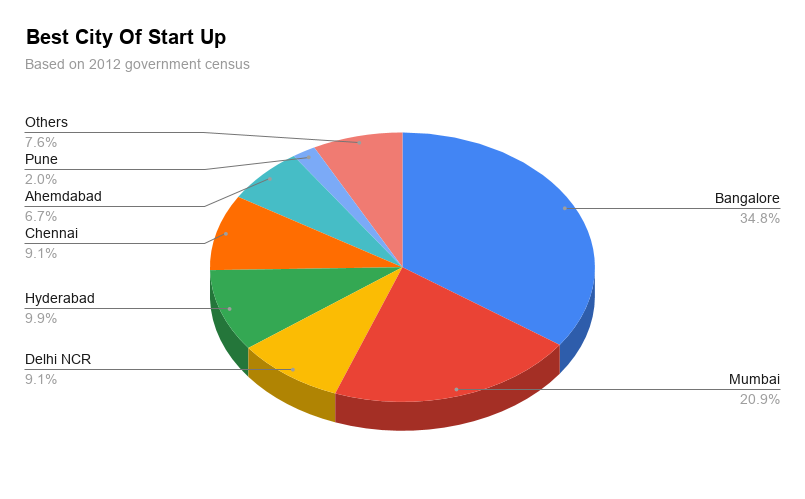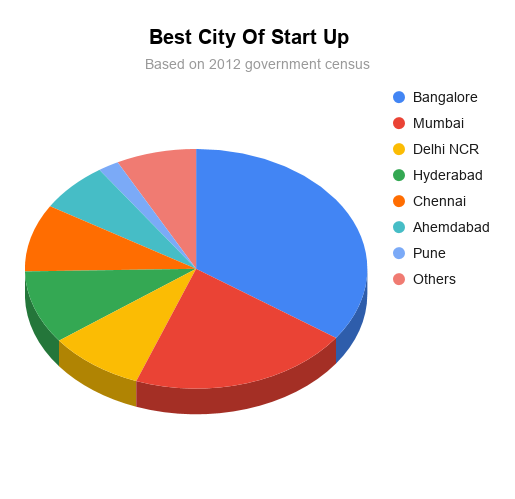Prime Minister Shri Narender Modi firstly announced Start-up India from the Red Fort New Delhi on the occasion of the Independence Day celebration on 15 August 2015. Afterward, on 16th January the scheme was formally launched for wealth creation and employment generation by the Prime Minister where many CEOs, venture capitalists, and startup founders were present.
In the last ten years, many companies started with an idea, and now they have become a worldwide recognized name. One 97, Freecharge, Bigbasket, Book my show, Hungama, Urbanladder, and many more and ruling the market with their advanced technologies, customer-centric approaches, and forward-looking outlook. The objectives of the scheme were to encourage next-generation entrepreneurship and to make India stand among the developed countries of the world.
Bangalore is ranking high on best city for start-ups, but when we talk about a number of startups funded in the last 3 years, Delhi NCR is the leader. It has a 33 percent market share overall. See the infographics for a number of start-ups funded in different cities of India.
If you are looking for information about a start-up India scheme, you are at the right place. In this informative blog, we will discuss the goals, benefits, eligibilities, and aspects of this scheme.
The goal of the scheme
1. To simplify the process and to encourage next-generation entrepreneurship, a provision for self-certification compliance is adopted.
2. Gradual reduction in the patent registration fee.
3. IPR protection to New Firms under start-up scheme.
4. Flexibility to pay income tax, capital gain tax for the first three years of operation.
5. Provision to create an innovation hub under the Atal innovation mission.
6. Special 90 days exit window under improved Bankruptcy code.
7. Targeting of 5 Lakh schools for innovation-related programs.
8. Relaxation from inspection for first three years
Benefits of Start-up India
1. For a long, entrepreneurs were complaining about obtaining different certifications and NOC from various departments. India’s rank on the ease of doing business was 142 in 2014, which is quite a low ranking just nearby the poorest and underdeveloped countries of Africa and Asia. You can imagine the level of roadblocks in the business arena. Businessmen often used to talk that doing business is easier than starting the business. The government of India simplified the whole process and integrated it into a single point of contact.
The ease of doing ranking is based on different parameters like business registration, electricity connection, trade, construction permits, and others. Since the launch of startup India, there is a gradual improvement in various parameters. A significant change can be seen in infographics.
2. A dedicated website https://www.startupindia.gov.in/ Was launched for incorporation, grievance registration, registration, patent acquisition, and other related work. The website works on the principle of network, participation, and access. Different stakeholders of startup ecosystem like investors, mentors, incubators, accelerators, and government bodies use the website to connect and share their ideas.
3. Despite launching various cash and loan schemes, businessmen find it difficult to get seed capital and working capital for their business. It was hampering their progress. Start-up India has a corpus provision of 10000 Crore. Under the scheme, the government will invest Rs. 2500 Crore per year in different start-ups.
4. Government is the largest investor, consumer, and facilitator of business and having a separate amount for investment is an added advantage. Starts ups are also relaxed under corporate tax, income tax, and capital gain tax provisions. The government allows flexibility and freedom from taxes for three years from the year of operation. That time window gives startups a breather to grow at a faster pace with a strong balance sheet.
5. Ideas and brands hold a key to success for business, and the patent/copyright registration area is such a programmatic segment that even large business people avoid going for that. Under startup India, the government provides an 80 percent rebate for patent registration. Furthermore, the patent registration process is simplified and accelerated.
6. Government purchases/avail large volume of products/ services for the benefit of citizens. In that process, it issues tenders. Millions of rupees worth tender are issued daily from autonomous bodies, government ministries, departments, undertakings, and organizations. The scheme has a provision to give preference to Startups for government tenders.
Process for registration to avail the benefits under the scheme
· You can register your business under the three category-
1. Partnership Firm
2. Limited Liability Partnership Firm
3. Private Limited Company
· Firstly the company should get registered under any category with the ministry of corporate affairs.
· After registration, approval is required from the Department of Industrial Policy and Promotion.
· A recommendation letter from an incubation center is a must. Incubation centers are generally nonprofit organizations that are operated by private and public entities. Incubation is a collaborative program created for entrepreneurs to grow.
· Application/documents mentioning innovative ideas/schemes and products related to the firm
· Papers showing total turnover of the company. The firm’s total turnover should not exceed 25 Crores.
· Apply under the scheme, and once approved, the business gets the benefits as mentioned above.
Different states/cities are improving their infrastructure, tax compliance rules, inspection parameters, and others. Bangalore is performing very well followed by Mumbai’s reason to attract start-ups. You may get a sneak peek at the position of various cities for attracting start-ups.

Switch into entrepreneurship and avail the amazing benefits of startup India for your business. Government is with you and actively supportive in your endeavors to get success. Create employment and become a part of India’s growth story.

